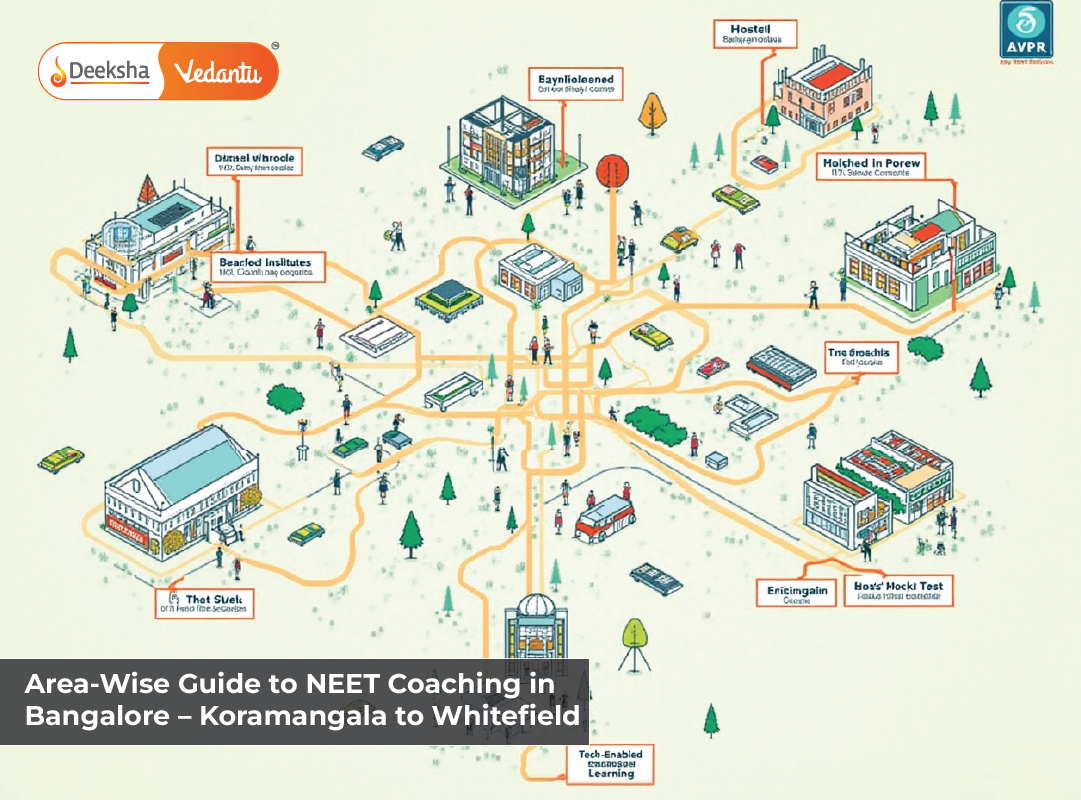Introduction
Commerce is a dynamic stream that forms the backbone of several professional fields such as accountancy, business, economics, finance, and law. For students pursuing Commerce in their Pre-University (PU) years, understanding foundational concepts with clarity is critical to academic success and career readiness. However, effective learning requires more than textbooks and lectures—it demands consistent guidance, discipline, and an immersive environment that encourages inquiry, exploration, and critical thinking.
Residential PU colleges offer a distinctive edge in this context. By combining structured academic programs with a holistic learning atmosphere, these institutions create an ideal space for students to thrive in Commerce subjects. At Deeksha Vedantu, we’ve tailored our residential Commerce PU programs to enhance learning outcomes, foster conceptual clarity, and prepare students for future challenges—both academically and professionally.
In this blog, we explore how residential PU colleges enhance the learning experience in Commerce and help students build strong academic, personal, and career foundations.
The Role of Environment in Commerce Education
Commerce subjects like Accountancy, Business Studies, and Economics are analytical, logic-driven, and detail-oriented. Residential PU colleges provide an uninterrupted environment conducive to deep, focused learning. A student’s surroundings significantly influence their ability to stay consistent with study habits and engage actively with subject material.
Environmental Advantages:
- Consistent academic rhythm without distractions
- Regular study hours under faculty supervision
- Ready access to peer discussions and doubt-solving
- Time allocated specifically for revision and practice
- Immersive learning setting away from external noise
Such an environment reduces cognitive overload and improves subject retention. It encourages focus and daily engagement, which are essential for success in subjects that require ongoing application and cumulative understanding.
Structured Schedules for Reinforced Learning
In residential campuses, academic life is well-organized. Students follow structured routines that balance classroom learning, self-study, assessments, and co-curriculars. This regulated framework minimizes wasted time and maximizes productivity.
Academic Structure:
- Regular classes covering PU board syllabus
- Timely assessments and concept-based evaluations
- Scheduled doubt-clearing and remedial sessions
- Night study halls with academic supervision
- Predictable routines to improve memory and retention
This rhythm encourages discipline and enables students to revisit challenging concepts consistently, laying the groundwork for long-term subject mastery. Structured schedules also allow students to mentally prepare for the day ahead, which leads to better focus during academic sessions.
Science PU programs offered by Deeksha Vedantu
Enhanced Mentorship and Faculty Interaction
One of the strongest pillars of a successful residential PU program is mentorship. Residential PU colleges facilitate greater interaction between students and faculty. Teachers serve not just as subject experts but also as mentors who guide students academically and personally.
Mentorship Benefits:
- Subject-wise performance tracking
- Personalized feedback and improvement plans
- Regular academic goal setting and review
- Emotional and motivational support
- Enhanced faculty availability through residential access
At Deeksha Vedantu, every student is assigned a mentor who monitors academic performance, offers subject-specific guidance, and supports overall development, ensuring no student is left behind in their journey.
Collaborative Peer Learning
Living and learning with peers in a residential setting fosters academic collaboration. Group studies, discussions, and idea exchanges enrich the learning experience. Commerce education, in particular, benefits immensely from peer learning as subjects like Business Studies and Economics thrive on debate, analysis, and case-based reasoning.
Peer Learning Advantages:
- Easier understanding of complex concepts
- Development of presentation and communication skills
- Exposure to diverse problem-solving approaches
- Encouragement through collective progress
- Sharing of study material and multiple viewpoints
Commerce subjects, especially Accountancy and Business Studies, benefit greatly from such collaborative formats where peer-led teaching, brainstorming, and revision enhance retention and understanding.
Application-Oriented Approach
One major gap in traditional classroom education is the limited scope for real-world application. Residential programs provide time and resources to focus on real-world applications of theoretical concepts, making learning more practical and engaging.
Subject-Specific Enhancements:
- Accountancy: Practical workshops, ledger writing, mock account books, balance sheet creation, GST practice modules
- Business Studies: Role plays, case studies, event simulations, entrepreneurial project planning
- Economics: Graphical representation of data, policy discussions, inflation tracking, macroeconomic debates
- Statistics: Data collection, trend analysis, correlation exercises, and usage of spreadsheet software
These hands-on experiences make abstract concepts relatable and prepare students for higher education and commerce-oriented careers.
How Residential PU Enhances Commerce Learning
| Commerce Subject | Residential PU Advantage |
| Accountancy | Regular ledger practice, peer correction, time-bound problem-solving, digital accounting exposure |
| Business Studies | Discussions, mock presentations, event planning, group projects, case competition simulations |
| Economics | Data analysis sessions, interactive visuals, current affairs integration, policy-based group debates |
| Statistics | Real datasets, time series plotting, test pattern familiarity, MS Excel-based assignments |
Integrated Competitive Exam Support
Commerce students may prepare for exams like CA Foundation, CS Foundation, CUET, or entrance tests for business schools. Residential PU colleges like Deeksha Vedantu integrate academic coaching with competitive prep, ensuring students are not overwhelmed and can handle both efficiently.
Integrated Support:
- Early exposure to professional courses and syllabi
- Weekly mock tests and application-based MCQs
- Faculty specialization in competitive modules and subject overlap
- Customizable preparation plans based on individual student goals
- Time-saving integration of board and exam prep in daily schedules
This dual-focus approach ensures that students don’t need to look outside for additional coaching. Instead, their entire preparation journey is planned, tracked, and guided in-house, reducing stress and improving outcomes.
Personal Growth Through Extracurriculars
Commerce is not just about academics—it also involves communication, creativity, collaboration, and leadership. Residential PU programs provide ample opportunities to develop these skills, which are essential in commerce careers such as business, management, law, and finance.
Growth Channels:
- Public speaking and debate clubs that boost confidence
- Business quiz teams, commerce fests, and national-level competitions
- Student-managed finance and entrepreneurship clubs
- Leadership roles in hostel, academic committees, and campus events
- Community service and social enterprise initiatives
Such experiences help students gain confidence, think critically, and build profiles that stand out in higher education admissions and future job placements.
FAQs
How does living on campus help Commerce students academically?
The residential model eliminates distractions, provides structured time for study, and allows easy access to mentors and faculty for real-time support.
Is there enough emphasis on concept clarity in Commerce subjects?
Yes. The residential model ensures personalized feedback, regular assessments, and group discussions to reinforce core concepts.
Do students have time for recreation and hobbies?
Absolutely. Structured schedules at Deeksha Vedantu balance academic focus with wellness, sports, and creative activities.
Are Commerce students given career counseling?
Yes. Students receive guidance on career options such as CA, CS, B.Com, law, management, and finance-related degrees.
Is residential life suitable for Commerce students who are introverts?
Yes. With a supportive community and caring faculty, even shy students gradually open up and thrive both academically and personally.
What if a student struggles in one subject like Accountancy?
Residential PU colleges provide one-on-one support, special doubt-clearing sessions, and peer study groups to help students catch up and excel.
Conclusion
Residential PU colleges create an ecosystem that naturally enhances the learning of Commerce subjects. With focused academic planning, expert mentorship, collaborative study culture, structured application-based learning, and integrated career support, students develop strong conceptual foundations while also evolving into confident, well-rounded individuals.
At Deeksha Vedantu, our residential Commerce PU programs are designed to provide this balance. By combining academic rigor with mentorship, peer learning, real-world application, and extracurricular development, we ensure that our students are fully prepared to excel not only in board exams but also in life.
Table of Contents















Get Social